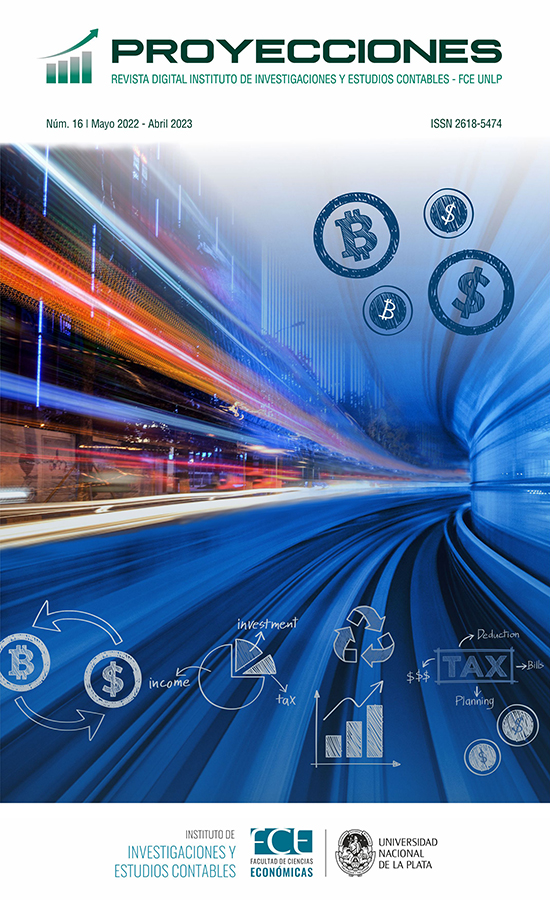Risks and opportunities externalization in integrated reporting of Argentine banks
DOI:
https://doi.org/10.24215/26185474e018Keywords:
Argentine banks, integrated reporting, riskd and opportunitiesAbstract
Integrated reporting is one of the most recent innovations in relation to sustainability and non-financial reporting in the world. It offers a synthetic and holistic view of organizations and their actions with the aim of being an instrument that meets the information needs of markets, society, investors or customers which go beyond the study of financial statements at present.
The purpose of an integrated reporting must be to provide all the companies´ information through a concise, complete and relevant communication of the special history of the organizations that describes the way in which the business model, strategy, governance, performance and prospects lead to value creation in the short, medium and long term by identifying risks and opportunities.
Its study represents a challenge for academic research considering the increasing demand of non-financial information, as well as the constant meetings between several regulatory agencies and normative issuers with the institutionality associated with Integrated Reporting.
This study is part of the research project called “Intellectual capital and value generation in organizations in the context of Integrated Reporting”. One of the specific objectives of this project is to analyze the viability and feasibility of explaining and adequately exposing the organizations´ value generators and the associated risks, which are part of the Integrated Reporting.
The general objective of this study is to analyze, in a comparative way, the risks and opportunities identified in the Integrated Reporting corresponding to 2019 of the only three Argentine banks that issue those reports named “Integrated Reporting”.
The reports respond to the requirements of the International Integrated Reporting Council (IIRC) Framework through different methodology implementation in order to identify the specific sources of risks and opportunities. The results showed an average degree of coincidence in the risks identified by the companies for the activity under analysis.
The analysis shows that the reports differ in terms of depth, scope and accuracy. In all cases it is only mentioned that they take specific procedures to mitigate and manage the risks found, although they are not specifically mentioned. It would be extremely important that companies could show the aforementioned proceedings in order to link them with the associated strategic objectives, strategies, policies, objectives and Key Performance Indicators.
It arises from this work that, in an area such as banking, with a highly regulated activity, homogeneous enough in terms of operations, exposed to risks and similar contingencies, there is a significant divergence with respect to the content of Integrated Reporting analyzed that makes it difficult for users to compare thus it limits their use.
Downloads
Metrics
References
Barbei, A. A., Neira, G. y Zinno Arbio, F. B. (2017). Reportes integrados: acercamiento desde la utilidad de la información (Documento de trabajo Nro. 045). Centro de Estudios en Contabilidad Internacional, Facultad de Ciencias Económicas, UNLP.
Edvinsson, L. (2013). IC 21: reflections from 21 years of IC practice and theory. Journal of Intellectual Capital, 14(1), 163-172.
Garde Sánchez, R. y López Pérez, M. V. (2016). Aplicación del informe integrado en las empresas públicas. Auditoría Pública, (68), 69-82.
Global Reporting Initiative (2016). Estándares GRI. https://www.globalreporting.org/standards/gri-standards-download-center/
Hoque, M. E. (2017). Why Company Should Adopt Integrated Reporting? International Journal of Economics and Financial Issues, 7(1), 241-248.
International Integrated Reporting Council. (2013). The International Framework. https://www.integratedreporting.org/wp-content/uploads/2015/03/13-12-08-THE-INTERNATIONAL-IR-FRAMEWORK-SPANISH-1.pdf
Jensen, J. C. y Berg, N. (2012). Determinants of traditional sustainability reporting versus integrated reporting. An institutionalist approach. Business Strategy and the Environment, 21(5), 299-316.
Kolk, A. (2010). Multinationals and Corporate Social Responsibility. Politeia, 26(98), 138-152.
Navarrete Oyarce, J. y Gallizo Larraza, J. L. (2019). Reporte Integrado como herramienta de transparencia empresarial. Revista Academia & Negocios, 4(2), 71- 82.
Organización Internacional para la Estandarización (2018). Norma ISO 31000: el valor de la gestión de riesgos en las organizaciones. https://www.isotools.org/pdfs-pro/ebook-iso-31000-gestion-riesgos-organizaciones.pdf
Organización de las Naciones Unidas. (2006). Guía Práctica para la COMUNICACIÓN DEL PROGRESO del Pacto Mundial de la Organización de las Naciones Unidas. http://pactoglobal.org.ar/wp-content/uploads/2015/02/Gu--a_CoP_2008.pdf
Organización de las Naciones Unidas (2015). Objetivos de Desarrollo Sustentable. https://www.un.org/sustainabledevelopment/es/
Rivera-Arrubla, Y. A., Zorio-Grimab, A. y García-Benau, M. A. (2016). El concepto de informe integrado como innovación en reporting corporativo. Journal of Innovation & Knowledge, 1(3), 144–155.
Tapscott, D. (2010). Prólogo. En R. G. Eccles y M. P. Krzus, One Report - Integrated Reporting for a Sustainable Strat- egy. John Wiley & Sons.
Yongvanich, K. y Guthrie, J. (2006). An extended performance reporting framework for social and environmental accounting. Business Strategy and the Environment, 15(5), 309-321.
Additional Files
Published
How to Cite
Issue
Section
License
Copyright (c) 2022 Jorge D. Símaro, Omar E. Tonelli, Francisco J. Varela

This work is licensed under a Creative Commons Attribution-NonCommercial-NoDerivatives 4.0 International License.
El material publicado en la revista se distribuye bajo una licencia de Creative Commons de Atribución-NoComercial-SinDerivadas 4.0 Internacional (CC BY-NC-ND 4.0). Esta licencia obliga a otros a dar crédito de manera adecuada, brindar un enlace a la licencia, e indicar si se han realizado cambios; no permite hacer uso comercial de la obra; y si se remezclara, transformara o creara otro material a partir de la obra, no podrá ser distribuida esa modificación.




























